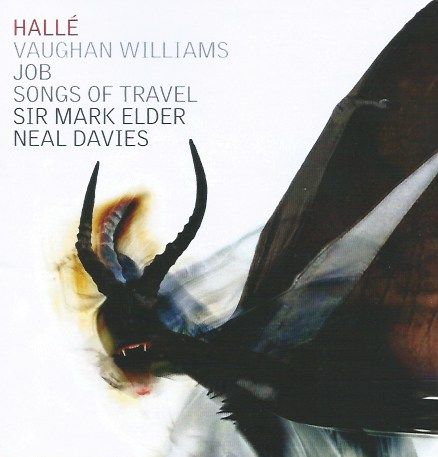Sir Mark Elder conducts Vaughan Williams

The Hallé Orchestra has long been associated with English music, and Sir Mark Elder has done much to extend this tradition. Here we have a mouthwatering coupling of songs (Songs of Travel) and the ballet, Job.
The Songs of Travel (1901-1904) feature the excellent bass-baritone Neal Davies, winner of the Lieder Prize at the 1991 Cardiff Singer of the World Competition, and a singer who just seems to go from strength to strength. Vaughan Williams sets texts by Robert Louis Stevenson and the songs, originally for voice and piano, are orchestrated by the composer and Roy Douglas.
I wonder if I am the only one who sees a parallel in intent between the first song, "The Vagabond," in which the protagonist tramps along the open road, and "Das Wandern," the first song of Schubert's song-cycle Die schöne Müllerin? Here's the version on this very disc, Neal Davies beautifully strong and focused, the Hallé perfectly paced by Sir Mark:
... and let's hear Thomas Quasthoff and Justus Zeyen in the Schubert:
There are moments of the utmost beauty in Vaughan Williams' cycle, too, plus some surprises: the fifth song, "In Dreams," is so heady it is almost hallucinogenic. The sixth, "The Infinite Shining Heavens," has a characteristic Vaughan Williams glow, a sort of contained ecstasy - think of the "On the beach at night, alone" Whitman setting from Sea Symphony. One might suggest parallels to Müllerin, too, in the progression of the cycle, from the optimistic gait of the first song to the resignation of the final song, "I have trod the upward and downward slope".
The "Masque for Dancing" Job, while accepted as one of his greatest works, gets remarkably short shrift in the concert hall. Certainly, Holst considered it a masterpiece. There have been notable recordings previously, though, not least Sir Adrian Boult, the work's dedicatee, with the LSO at Kingsway Hall in 1970 (one of several by that conductor), but one mustn't forget such stalwarts of the English music scene as Richard Hickox (Bournemouth SO), Andrew Davis (twice over, Bergen PO and the BBCSO), and David Lloyd-Jones (English Northern Philharmonia on Naxos). And here is one by Sir Mark Elder that joins the greats but also brings the work to our attention today; it has to be said, is certainly not sacrilegious to mention Elder in the same sentence as Boult.
Vaughan Williams' music in Job is inspired. Listen to the pastoral perfection of the opening scene, "Hast thou considered my servant, Job" ; this section also describes the entrance of Satan and his challenge to God:
The gossamer music of "Minuet of the Sons of Job and their Wives" finds Vaughan Williams scoring absolutely magically while spicing the harmony with the most exquisite dissonances (the "Dance of the Three Messengers" offers similar delights). An encapsulation of the variety Vaughan Williams uses in this score can be found in "Job's Dream," which, while it begins peacefully in glorious Vaughan Williams-ish slumber, soon moves to a contrastive "Dance of Pestilence, Famine and Battle".
With a recording that captures the present day sleek and beautiful sound of the Hallé Orchestra. this is something of a must-have. The Hallé/Elder combo just goes from strength to strength ...
This disc is released today, Friday October 2, 2020l thsi article is published on teh day of release.
